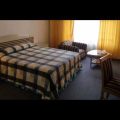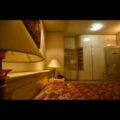(18 Jan 1996) Bengal/Nat
Dhaka’s floating hotels are a fixture of the city’s business life and cultural history.
But now the hotels are slowly disappearing as many hotel owners are choosing to move to dry land.
Floating hotels, usually run by Bangladesh’s Hindu minority, have been a part of Dhaka for centuries.
The hotels are basically two-storey barges, moored along the river Buriganga in Dhaka.
They cater mainly to peddlers and street hawkers who travel to the capital from the countryside to sell their goods.
Floating hotels provide them with cheap room and board.
This cloth salesman who lives outside Dhaka says he stays in floating hotels whenever he comes to the capital.
SOUNDBITE: (Bengali)
“I come to this hotel whenever I am in Dhaka. They have all kinds of Bengali dishes and they’re cheap. The rooms are also cheaper here than in other hotels.”
SUPER CAPTION: Mr. Nasir, Hotel patron
This man has been running the Buriganga Hindu Hotel for 24 years.
SOUNDBITE: (Bengali)
“Peddlers and street hawkers are my main customers. They come to rest and eat and the food is good and cheap”.
SUPER CAPTION: Mr. Nitta Lal Majumder, Floating Hotelier
Some hawkers rest during the hot day, before setting out in the evening to sell their wares.
Dinner is a time for the salesmen to talk business strategy, before retiring to the hotels not-so-deluxe four foot by three foot rooms — usually shared by two.
Evening is also a time for counting the day’s earnings.
These small-time businessmen are the hotels’ main clients so each room comes with a metal safe-deposit box hung on the wall.
But the floating hotels are slowly disappearing — victims of a rapidly modernising third world.
Find out more about AP Archive: http://www.aparchive.com/HowWeWork
Twitter: https://twitter.com/AP_Archive
Facebook: https://www.facebook.com/APArchives
Instagram: https://www.instagram.com/APNews/
You can license this story through AP Archive: http://www.aparchive.com/metadata/youtube/4c29e275c1b0fabe9c34e3f61f677e03








